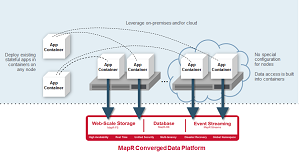News
Big Data Specialist MapR Technologies Offers Docker Platform
- By David Ramel
- February 7, 2017
MapR Technologies Inc. today announced its new Converged Data Platform for Docker to simplify the use of container technologies in the enterprise by providing persistent data storage services.
While the enterprise use of container technology is growing, according to multiple surveys, one oft-cited sticking point is the complexity of implementing the technology, especially when it comes to accounting for the persistent storage of data, including application state data.
Containers wrap up software, including applications, in a discrete package that encapsulates associated resources such as code, runtime, system tools and system libraries -- or as container leader Docker Inc. says: "anything that can be installed on a server."
As The New Stack reported, "Since they are self-contained, Docker containers can be launched on any host with no dependencies or affinity to a specific host. While this is certainly an advantage for Web-scale workloads, it becomes a challenge to run stateful applications that deal with persistent data."
In fact, "Persistent storage was reported as the number one barrier to container adoption this year, ahead of security," ClusterHQ reported in a recent survey.
It's that barrier -- especially pertaining to stateful data such as configuration settings, user profiles, logs/history and so on -- that MapR is addressing with its converged data platform, centered on the new MapR Persistent Application Client Container (PACC).
 [Click on image for larger view.]
The PACC Approach (source: MapR Technologies)
[Click on image for larger view.]
The PACC Approach (source: MapR Technologies)
"By building your application container on top of the MapR PACC, you can connect it to MapR for reliable persistence," the company said in a blog post today. "With this, containerized applications can survive application failure, hardware failure, or even whole datacenter failure."
The PACC also handles persistent data for microservices, which are often small, modular single-purpose applications used hand-in-hand with containers. Rather than being stateless, microservices just persist data in different ways, MapR said, such as using files to store logs and streams to store metrics.
"With the MapR Converged Data Platform for Docker, persistent data services, especially those appropriate for microservices, are universally available, reliable and scalable," MapR said. "This means application developers can spend their time writing applications and business logic instead of managing infrastructure, and all enterprise applications inherit consistent security and reliability from the platform."
The company said its new PACC provides:
- A pre-built Docker container image that provides application access to files, database tables and streams via MapR's platform components for file storage (MapR-FS), database storage (MapR-DB) and streaming (MapR Streams).
- Secure authentication at the container level.
- Scalable, high performance.
- Extensible support for application layers.
- Availability in Docker Hub and as a Dockerfile for customizability.
Concerning the included Docker image, the company said, "A Docker image is provided for connecting to all converged data platform services, including MapR-FS, MapR-DB and MapR Streams. The image is streamlined to include all the necessary bits -- no more, no less -- required to leverage MapR as a persistent data store for your containerized applications."
MapR also listed the platform's specific capabilities for stateful applications, including:
- Secure, reliable, high-performance data storage for configuration, logging and binary state.
- Scale out NoSQL key/value and document database storage for operational and lightweight analytics.
- Global event streams with persistence for inter-microservice communication state.
"Agile enterprises today need their operational and analytical apps and microservices to be 'stateful' or aware of not just the 'now,' but historical information and context as well," MapR quoted Enterprise Management Associates analyst John L Myers as saying.
"Approaches where developers are required to deploy dedicated data management and streaming services slow implementation and impede flexibility," Myers continued. "Focusing application developers on application logic and functions, speeds development and adds to implementation agility. The MapR Converged Platform empowers the deployment of stateful containerized applications via shared, multi-tenant data and streaming services."
About the Author
David Ramel is an editor and writer at Converge 360.